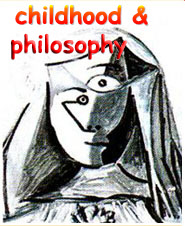foucault and incendiary childhoods: experiences of other truths and other heterotopias
DOI:
https://doi.org/10.12957/childphilo.2016.23345Keywords:
infâncias, verdades, heterotopias, infâncias heterotópicas, FoucaultAbstract
This paper considers the play Incendies (MOUAWAD, 2013) as a fictional “making" in the sense proposed by Foucault (1994) of writing history. It aims to investigate how a set of heterotopic experiences can give rise a corresponding set of problematizations concerning the historical connections of childhoods with truths. For this purpose, the paper describes two moments. The first investigates the problematic issue of the birth of truth (NIETZSCHE, 2001; FOUCAULT, 2006), with the aim of awakening some interventions at the truth's bonds by other experiences, to think childhood in a plural dimension, covered by and other histories. In the second moment, the paper focuses on the question of a notional construction of childhoods as heterotopias (FOUCAULT, 2009), highlighting some achievements and some consequences of this approach for the experiences of the contemporary childhoods. We highlight in this regard the right to childhood, the singularity of the worlds of childhood, and the micro-revolutionary dimension of each childhood as a field of problematization, and thereby 1) show how the theme of childhood is a political one and, 2) recognize the urgent need to produce alternative policies that address the multiplicity of childhoods. Finally, this paper proposes the term "incendiary” for those childhoods that live and work with other truths and other histories—that is, with their own heterotopias.Downloads
Published
2016-06-25
How to Cite
carvalho, alexandre filordi de. (2016). foucault and incendiary childhoods: experiences of other truths and other heterotopias. Childhood & Philosophy, 12(23), 65–86. https://doi.org/10.12957/childphilo.2016.23345
Issue
Section
dossier




